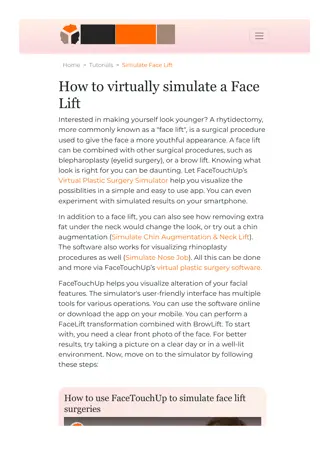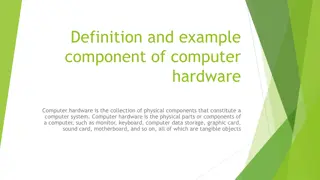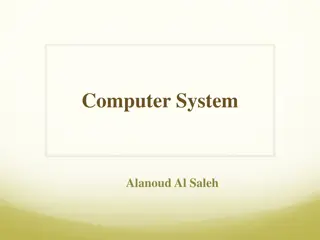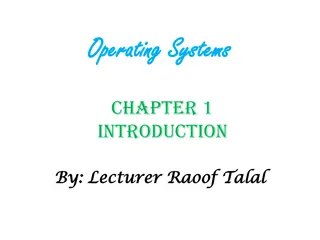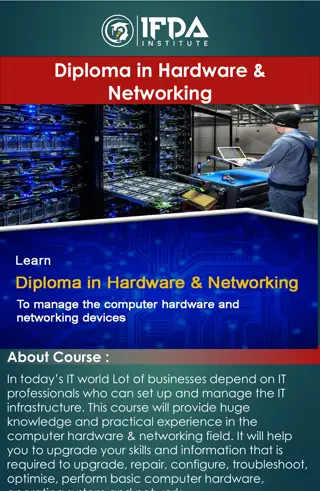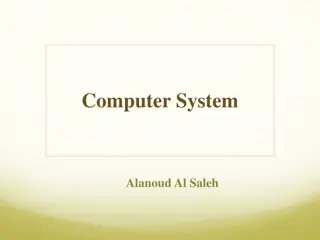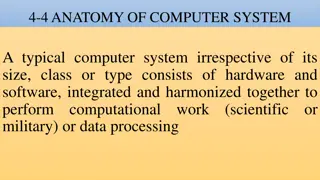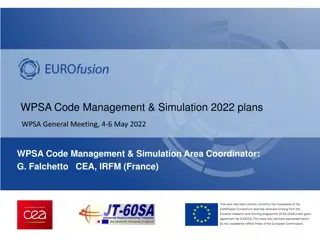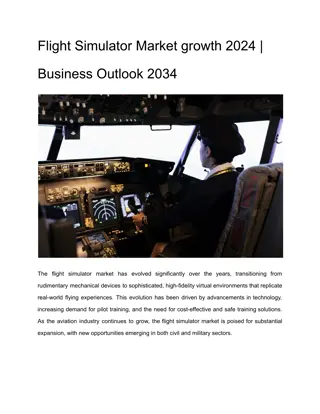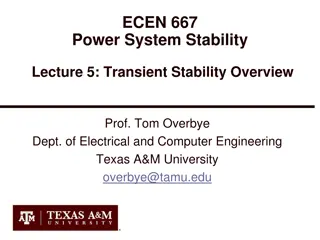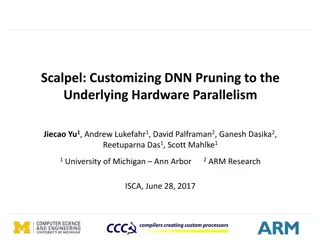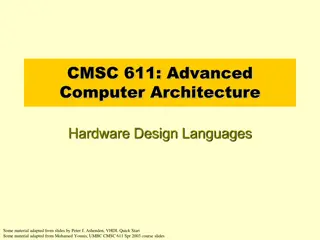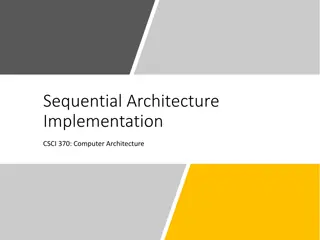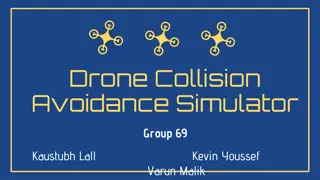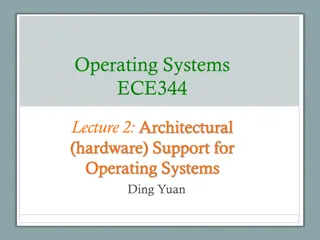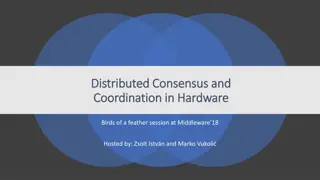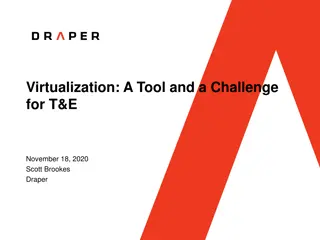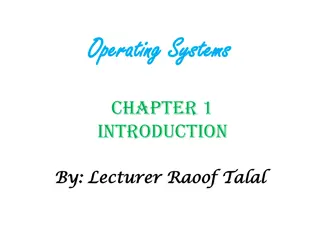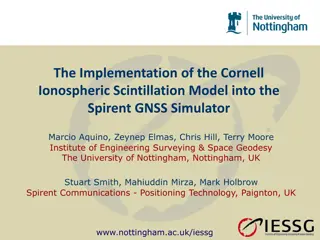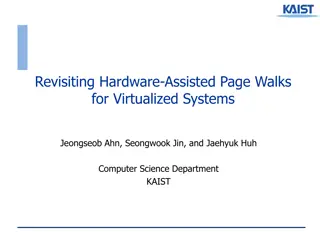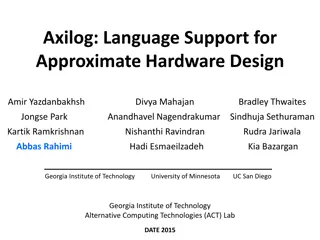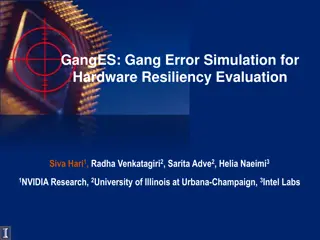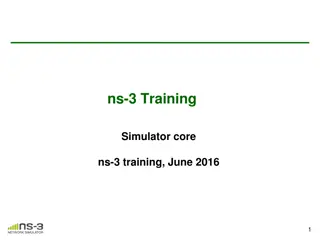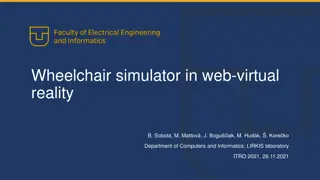Global Flight Simulator Market
The Global Flight Simulator Market Size is expected to reach USD 8.2 Billion by 2033, at a CAGR of 2.35% during the forecast period 2023 to 2033.\n\n
0 views • 4 slides
Understanding Computer Organization and Architecture
A computer system is a programmable digital electronics device that processes data as per program instructions to provide meaningful output. It comprises hardware and software components, with hardware being the physical parts and software essential for driving the hardware. Computer organization fo
14 views • 71 slides
Addressing Monitoring Challenges in Hardware Offloading
Exploring the complexities of offloading monitoring tasks in hardware, this content delves into the limitations of current methods such as move_pages and IBS/PEBs-based monitoring. It highlights the need for efficient tracking mechanisms like IDLE-bit and proposes innovative solutions like Transpare
3 views • 17 slides
Hold Down and Release Mechanism Hardware Simulator for Ground Deployment Testing
The project involves developing a hardware simulator for testing a Hold Down and Release Mechanism used in Mars Sample Return missions. The simulator aims to replicate the functionality of expensive flight hardware at a lower cost and with reduced lead time. Key requirements include precise activati
3 views • 8 slides
Gaming Racing Simulator Gtrsimulator
Gtrsimulator.com allows you to feel the excitement of racing! With exceptional quality and unrivalled performance, this racing simulator game offers you the most lifelike driving experience. Push the envelope and start a career as a professional driver right now!\n\n\/\/gtrsimulator.com\/collections
7 views • 1 slides
Breast Augmentation Surgery| Breast Implant Simulator
Experience breast augmentation surgery with a realistic breast implant simulator, facilitating informed decisions and optimal outcomes for patients.\n
0 views • 10 slides
Aesthetic Nose Job Simulator, Visualizer Morphing Software | Rhinoplasty Simulat
Tutorial that show you how to transform your appearance with an aesthetic nose job simulator visualizer and Morphing software. Very realistic simulator for personalized cosmetic enhancements\n
0 views • 8 slides
Stainless Steel D Rings, O Rings & Weldable D Ring Hardware
Explore our collection of high-quality stainless steel D rings, weldable D rings, and versatile O rings. Ideal for various hardware applications, our rings ensure durability and reliability. Shop now at Buckles International for premium hardware rings.
0 views • 9 slides
Virtual Face Lift Simulator for Plastic Surgeons | Best Plastic Surgery Simulato
Help your patients visualize facial plastic surgery results by using the best interactive plastic surgery simulator. Reach us for more details on Best Plastic Surgery App For Surgeons.\n
0 views • 8 slides
Overview of Computer Hardware Components and Software Functions
Computer hardware components such as monitor, CPU, mouse, and projector are essential physical parts of a computer system, while software includes intangible programs like operating systems and utility software. Hardware components perform tasks like displaying data, processing information, and prin
8 views • 9 slides
Understanding Computer Systems: Components and Organization
Computer systems are high-speed electronic machines that process data and instructions through hardware and software components. The elements include hardware, software, and users, with binary systems using bits and bytes to represent data. The organization of a computer involves input, CPU, memory,
2 views • 21 slides
Social Value Database and Simulator for Public Health: A Game-Changer in Health Economics
Utilizing a Social Value Database and Simulator can revolutionize public health programs by collating valuable evidence, focusing on Social Return on Investment (SROI), and offering a holistic view of health economics. This innovative approach aids in understanding the broader impacts of health init
0 views • 5 slides
Understanding Operating Systems: Introduction and Functions
An operating system plays a crucial role in managing computer hardware and facilitating user-computer interactions. It serves as an intermediary between users and hardware components, ensuring efficient resource allocation and control. The operating system coordinates the use of hardware resources b
5 views • 16 slides
Diploma in Hardware & Networking: Upgrade Your IT Skills
This course provides comprehensive knowledge and practical experience in computer hardware and networking, essential for managing IT infrastructure. Gain expertise in PC hardware maintenance, customer and networking support, and more to pursue a career as a Hardware and Network Engineer. Learn to as
1 views • 8 slides
Understanding Computer Systems and Components
Computer systems are high-speed electronic machines that process data and instructions to solve problems. They consist of hardware and software elements, with input and output devices for interaction. Key concepts include binary system, byte measurement units, hardware organization, and input hardwa
1 views • 21 slides
Anatomy of a Computer System: Hardware Components and Functions
A typical computer system consists of hardware and software working together to perform various computational tasks. The hardware components include the central processing unit (CPU), input/output devices, storage units, and the motherboard. The CPU acts as the main brain of the computer, performing
6 views • 6 slides
Understanding Computer Hardware Components
Computer hardware encompasses the physical components of a computer system that can be touched and felt, such as the motherboard, CPU, RAM, and storage devices like HDD and SSD. Without hardware, essential software cannot run efficiently. This lesson explores the definition, importance, and various
1 views • 6 slides
EUROfusion WPSA Code Management and Modelling Activities 2021-2022
EUROfusion's WPSA Code Management and Modelling activities for 2021-2022 focus on developing operation-oriented tools and synthetic diagnostics for JT-60SA scientific exploitation. The tasks include discharge simulator development, breakdown simulator optimization, Energetic Particle stability analy
0 views • 12 slides
Flight Simulator Market growth 2024 Business Outlook 2034
The flight simulator market is evaluated at a valuation of $8.77 billion in 2024 and is projected to expand at a CAGR of 7.06% to reach $17.34 billion by 2034.\n\nRead Report Overview: \/\/bisresearch.com\/industry-report\/global-flight-simulator-mar
1 views • 4 slides
Power System Transient Stability Overview: ECEN 667 Lecture Summary
This summary covers the key points discussed in the lecture on transient stability in power systems by Professor Tom Overbye at Texas A&M University. Topics include contingency analysis, results interpretation, PowerWorld Simulator usage, plotting results, and more. Detailed information is provided
0 views • 43 slides
Using Excel Simulator in Teaching Macroeconomics: A Modern Approach
Explore the benefits of incorporating a macroeconomics simulator in teaching, focusing on addressing challenges in understanding model dynamics and how different models relate to each other. The simulator helps students grasp complex concepts such as shocks, policy responses, and real-world applicat
0 views • 23 slides
Optimizing DNN Pruning for Hardware Efficiency
Customizing deep neural network (DNN) pruning to maximize hardware parallelism can significantly reduce storage and computation costs. Techniques such as weight pruning, node pruning, and utilizing specific hardware types like GPUs are explored to enhance performance. However, drawbacks like increas
0 views • 27 slides
Overview of Fly and Trajectory Scans in Data Acquisition
Fly and trajectory scans in data acquisition involve software and hardware options for acquiring data while positioners move at constant speeds. Software fly scans enable periodic data acquisition triggered by software, while hardware fly scans rely on pulses from positioners. Hardware fly choices a
0 views • 14 slides
Introduction to Brian: A Simulator for Spiking Neural Networks
Brian is a simulator designed for spiking neural networks, focusing on ease of use, flexibility, performance, and reliability. It allows runtime code generation, C++ conversion, and GPU support for enhanced performance. Despite limitations in large-scale simulations, Brian is ideal for small network
0 views • 7 slides
Understanding Hardware Design Languages in Advanced Computer Architecture
This material covers topics like behavioral correctness, timing simulations, domains, and levels of modeling in hardware design languages. It discusses functional and structural modeling, as well as the use of simulators to analyze and verify system behavior. Hardware Design Languages, behavioral de
0 views • 38 slides
Understanding Y86-64 Instruction Set and Hardware Control Language
Delve into the Y86-64 instruction set architecture, exploring sequential architecture implementations for computer architecture. Uncover the various instruction sets and their functionalities, such as halt, nop, call, ret, and more. Additionally, discover the building blocks of hardware, including A
0 views • 51 slides
Enterprise Content Management (ECM) ROI Simulator: Maximizing Investment Returns
Dive into the world of Enterprise Content Management (ECM) with the ROI simulator, a tool designed to help IT managers justify their investments in ECM infrastructure. Discover the key benefits, input and output processes, and a detailed walk-through of the simulator. Learn how to analyze financial
0 views • 25 slides
Drone Collision Avoidance Simulator for Autonomous Maneuvering
Our project focuses on developing a drone collision avoidance simulator using NEAT and Deep Reinforcement Learning techniques. We aim to create a model that can maneuver obstacles in a 2D environment, enhancing performance and survivability. Previous attempts utilizing non-machine learning solutions
0 views • 28 slides
Architectural Hardware Support for Operating Systems in ECE344 Lecture
The lecture discusses the importance of hardware support in operating systems, emphasizing the management of hardware resources and providing a clear interface to programs. It explores the fundamental relationship between operating system functionality and hardware, highlighting how hardware support
0 views • 53 slides
Distributed Consensus and Coordination in Hardware Birds of a Feather Session
Specialists in distributed consensus and hardware coordination gathered at Middleware 18 for a session hosted by Zsolt István and Marko Vukoli. The session covered topics such as specialized hardware, programmable switches and NICs, P4 language for expressing forwarding rules, and deployment exampl
0 views • 33 slides
Understanding Virtualization: Hardware Abstraction and Hypervisor Concepts
Dive into the world of virtualization with a focus on hardware abstraction and hypervisor technology. Explore the definitions and examples of hardware virtualization, hypervisors, and hardware abstraction, shedding light on how they enable multiple operating systems to coexist on a single physical m
0 views • 21 slides
Understanding Operating Systems: An Introduction and Overview
An operating system is a crucial program that manages computer hardware and serves as an intermediary between users and hardware. This chapter explores the role of operating systems in a computer system, covering components like hardware, application programs, and users. It delves into how operating
0 views • 16 slides
Implementation of Cornell Ionospheric Scintillation Model in Spirent GNSS Simulator
Researchers from the University of Nottingham and Spirent Communications collaborated to implement the Cornell Ionospheric Scintillation Model into the Spirent GNSS Simulator. The study focuses on the diffractive effects of ionospheric scintillation on GNSS signals, examining small-scale plasma irre
0 views • 24 slides
Hardware-Assisted Page Walks for Virtualized Systems
Virtualization in cloud computing and server consolidation relies on hardware-assisted page walks for address translation in virtualized systems. This involves two-level address translations to ensure isolated address spaces for each virtual machine, utilizing multi-level page tables to manage memor
0 views • 32 slides
Approximate Computing in Hardware Design: A Comprehensive Overview
Explore the groundbreaking concepts of approximate computing in hardware design, which involves embracing errors to enhance resource efficiency and performance. Delve into topics such as avoiding worst-case design, criteria for approximate HDL, safety in hardware, and relaxing accuracy requirements
0 views • 31 slides
Overview of Link Aggregation Simulator
This presentation provides an overview of a Link Aggregation Simulator designed to demonstrate and test LACP and DRCP operation. It guides users through creating devices, adding components, including link aggregation, and scheduling events. The simulator allows for testing of network components and
0 views • 20 slides
Triple Monitor Racing Sim Ultimate Immersive Racing Experience
Playing GTR Simulator will give you the rush of a lifetime in a virtual triple-monitor racing experience. Experience the most realistic driving simulator on the market. Visit GTRSimulator.com and race to the top!\n\n\/\/gtrsimulator.com\/products\/tr
3 views • 1 slides
GangES: Gang Error Simulation for Hardware Resiliency Evaluation
GangES introduces a new error simulator to expedite full error simulations for assessing hardware resiliency. By reducing the number of simulations and leveraging program structure, it achieves significant time savings over existing methods. Additionally, the study explores the feasibility of progra
0 views • 38 slides
Understanding ns-3 Training Simulator Core Concepts
ns-3 Training Simulator core concepts involve simulation time events, scheduler commands, random variables, virtual time advancement, program flow handling, command-line arguments, time management, event execution, and scheduler functionalities. Learn about handling program inputs, configuring topol
2 views • 17 slides
Wheelchair Simulator in Web Virtual Reality
The presentation discusses the development of a wheelchair simulator using web-based virtual reality technology, particularly on the LIRKIS G-CVE platform. This system aims to provide a virtual environment for individuals who need to learn wheelchair skills due to temporary or permanent immobilizati
0 views • 13 slides








